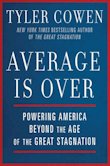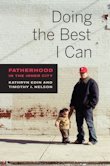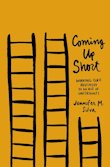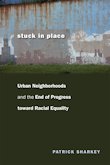Need a last minute gift for the social policy wonk in your life? Thanks to e-books and Amazon Prime, it’s not too late, and Social Mobility Memos is happy to help. Here are six of our favorite social mobility books from the last year:
 |
Average is Over: Powering American Beyond the Age of the Great StagnationBy Tyler Cowen (Dutton Adult) Cowen, a popular economic blogger and professor, sketches a predicted future where technology cleaves American society into two disparate classes: winners with skills that complement those of the new machines, and losers whose skills do not. Cowen is optimistic about the implications of this new society for opportunity: inequality will be defined entirely by merit, and upward mobility will be contingent on motivation rather than family background. Others (including our own review) are more skeptical.
|
 |
The Unwinding: An Inner History of the New AmericaBy George Packer (Farrar, Straus and Giroux) Packer’s richly-told, National Book Award-winning masterpiece tells the story of the American economy through a series of interwoven profiles and short riffs. Packer gives new life to familiar themes–a polarized economy, bleak economic prospects, a self-serving Washington establishment—with a set of characters that include a factory worker-turned-community organizer in Youngstown, Ohio; Jay-Z; libertarian Silicon Valley investor Peter Thiel; the city of Tampa; a Washington lobbyist; and Alice Waters |
 |
Scarcity: Why Having Too Little Means So MuchBy Sendhil Mullainathan and Eldar Shafir (Times Books) Harvard economist Mullainathan and Princeton psychologist Shafir examine how scarcity – and our flawed responses to it – shapes our economic lives and beyond. Of particular interest to students of economic mobility is their novel perspective on why the poor stay poor: poverty taxes the mind in ways that make it difficult (if not impossible) to make meaningful plans for the future. |
 |
Doing the Best That I Can: Fatherhood in the Inner CityBy Kathryn Edin and Timothy J. Nelson (University of California Press) Drawing on years of fieldwork, sociologists Edin and Nelson offer a paradigm-shifting look at fatherhood among “deadbeat dads” that sheds light on the significant obstacles facing low-income men at every step in the family formation process. Given the critical role parents play in shaping the opportunities available to the next generation, this is a must-read for those interested in tackling challenges to intergenerational mobility. |
 |
Coming Up Short: Working-Class Adulthood in an Age of UncertaintyBy Jennifer Silva (Oxford University Press) Drawing on in-depth interviews with 100 working-class young adults, Coming Up Short paints a picture of an America where the erosion of traditional markers of adulthood (marriage, job, homeownership) have changed what it means to “grow up” in post-industrial America. Silva, a sociologist of culture and inequality, describes adulthood redefined for a generation, with serious implications for the nation’s civic and economic life. |
 |
Stuck in Place: Urban Neighborhoods and the End of Progress Toward Racial EqualityBy Patrick Sharkey (University of Chicago Press) Sharkey uses four decades of longitudinal data to trace the relationship between neighborhood racial segregation and disparate opportunities for black and white Americans across the generations. Decades after the Civil Rights Era, neighborhood inequality that existed in the 1970s has been passed down to the current generation of African Americans. Sharkey proposes an urban policy agenda designed to create transformative changes in urban communities and the families that live in them. |
Note: In the coming year, we plan to continue to review notable research on economic mobility in a recurring series we’re calling the Lit Review. Feel free to contact us with suggestions of research you think we ought to know about!


Commentary
The Lit Review: Best of 2013 in Social Mobility Research
December 23, 2013